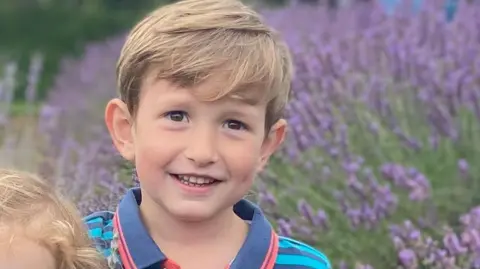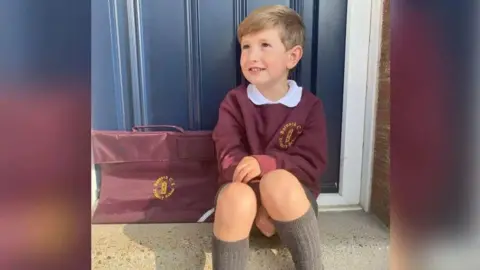Jury hears 999 call moments before boy's death
 Family handout
Family handoutThe dying moments of a five-year old boy receiving CPR from his father during a 999 call has been played out to an inquest jury.
Benedict Blythe, from Stamford, Lincolnshire, was twice sick and collapsed at Barnack Primary School in December 2021. He was pronounced dead in hospital a short while later.
A teacher could be heard on the call saying Benedict had turned "blue at the mouth" and was "unconscious" before a handler gave instructions in administering CPR, which was given by his father, Peter Blythe.
The inquest into his death at Peterborough Town Hall earlier heard Benedict had an allergic reaction to food before he was treated with an EpiPen prior to the call.
The inquest was told Benedict was in and out of consciousness and had stopped breathing and responding before CPR instructions were relayed to the father, during which time there were moments Benedict was "gurgling".
 Family handout
Family handoutThe jury heard paramedics arrived at the scene about 20 minutes later after they "got stuck at a railway crossing". The team then took over chest compressions and continued treating Benedict in the ambulance on route to hospital.
The inquest also heard evidence by Alison Ismail, the director of special educational needs and disability and alternative provision at the Department for Education.
She was asked by a legal representative on the possibility of preventing future deaths and said the government was "committed" to reviewing all statutory and non-statutory guidance on how schools supported children with specific medical conditions.
The inquest, which started on 30 June, previously heard that milk was Benedict's only allergy that could have caused a potentially fatal reaction.
Benedict vomited and developed breathing problems when he ingested cow's milk protein.
Area coroner Elizabeth Gray was told the five-year-old was pronounced dead at 12:57 in Peterborough City Hospital and died due to food-induced anaphylaxis.
Benedict had asthma and a number of allergies, including to milk and eggs.
Jurors previously heard Benedict had been kept off school on 30 November after being sick the night before.
 Family handout
Family handoutHe went back on 1 December after his mother Helen, who gave evidence last week, said he "was fine and didn't appear to be unwell".
That day, while outside with other children during morning break, Benedict ate a gingerbread biscuit he had taken with him from home, the inquest had heard.
He then returned to the classroom, where he was offered oat milk but was said to have refused it.
He fell ill shortly after that before his death from food-induced anaphylaxis.
On Wednesday, head teacher Amy Jones explained that Benedict's oat milk was in a labelled carton provided by his parents and kept in a staff fridge.
There was another child in the class who had lactose-free milk, and his milk was kept in the same fridge as Benedict's.
On Thursday, consultant Dr Shuaib Nasser was asked whether, if the milk lids had been swapped, it would have been enough to cause an allergic reaction, to which he replied: "It's unlikely that the lid was the source of the contamination."
The inquest continues.
Listen to highlights from Lincolnshire on BBC Sounds, watch the latest episode of Look North or tell us about a story you think we should be covering here.
